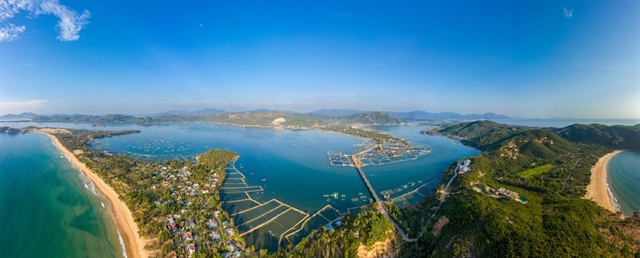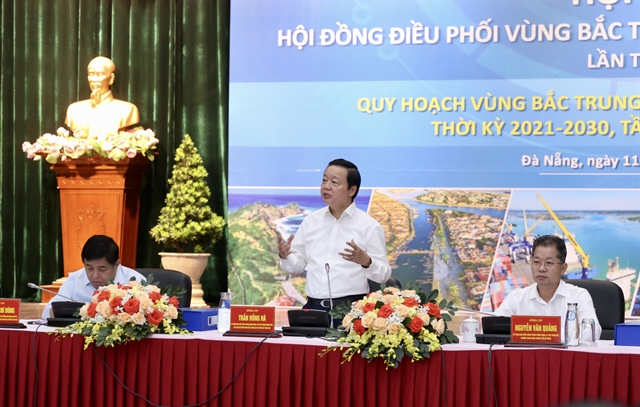 Politics & Law
Politics & Law


|
| Sông Cầu township in the south-central coastal province of Phú Yên. — VNA/VNS Photo Châu Đạo Cường |
ĐÀ NẴNG — Deputy Prime Minister Trần Hồng Hà on Wednesday chaired the second conference of the Coordination Council for North Central and Central Coastal regions for 2021-30 with a vision towards 2050, held in the central city of Đà Nẵng.
Of 110 national-level planning projects, 86 have been reviewed, including 16 sectoral and national-level plans. Moreover, 5 out of 14 provincial-level plans within the region have been approved by the Prime Minister, Minister of Planning and Investment Nguyễn Chí Dũng said.
The North Central region (comprising six provinces: Thanh Hoá, Nghệ An, Hà Tĩnh, Quảng Bình, Quảng Trị, and Thừa Thiên-Huế) and Central Coastal region (consisting of eight localities: Đà Nẵng City, Quảng Nam, Quảng Ngãi, Bình Định, Phú Yên, Khánh Hoà, Ninh Thuận, Bình Thuận) are strategically important in terms of politics, economy, culture, society, defence, security, and foreign relations for the entire country. This region boasts a coastline stretching nearly 1,800km, accounting for over 55 per cent of the country's total.
The average economic growth rate for the region from 2005 to 2020 was 7.3 per cent per year, higher than the national average of 6.36 per cent. The region's economic scale was VNĐ1,157 trillion (approx. US$47 billion) in 2020, 3.3 times higher than in 2010. The economic structure has shifted towards a service and industry-dominated economy, and several key sectors, especially those related to the marine economy, have experienced significant development. Tourism has also become a pivotal industry.
Recognising the region's potential and advantages, Minister Dũng proposed that the region focus on developing a robust and sustainable marine economy and invest heavily in key infrastructure, energy, information infrastructure, digital transformation, education, training, healthcare, disaster prevention, and climate change adaptation.
He also encourages enhanced collaboration and cooperation among provinces for economic and social development and aims to cultivate comprehensive economic, cultural, social, and environmental systems, emphasising improvements in education and training.
Vocational education aligned with regional strengths and developmental orientations is a crucial element for the region's progress, Minister Dũng remarked.
During the conference, the Ministry of Planning and Investment sought input and feedback from members of the Coordination Council, relevant agencies, organisations, experts, and scientists regarding the draft planning for the region. Based on this input, the ministry will further study and refine the regional planning documents for review and approval according to regulations.

|
| Deputy Prime Minister Trần Hồng hà addresses the second conference of the Coordination Council for North Central and Central Coastal regions for 2021-30 with a vision towards 2050 in Đà Nẵng on Wednesday. — VNA/VNS Photo Trần Lê Lâm |
Deputy PM Hà, concluding the conference, underscored that the planning for the North Central and Central Coastal regions for the period 2021-2030, with a vision up to 2050, once approved by the Government leader, will serve as an essential foundation for various levels, departments, and localities to research, develop, and implement policies, plans, development programmes, and investment projects, aiming to foster sustainable economic and social development for the nation, the region, and its localities.
He stressed that the planning for the region is a transition from policies and concepts to practical regional development. Therefore, it is essential to clarify planning issues, encourage discussions in the region, identify economic and social potentials and strengths, as well as promote development that extends across the entire region.
The planning should be implemented in a priority-based manner, with an emphasis on projects that drive the region's development and promote connection, instead of focusing on individual economic and social projects in each locality. Deputy PM Hà cited interprovincial projects within the subregions or across the entire regions as an example. VNS




